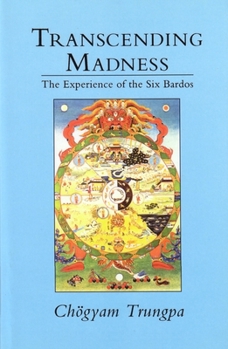Transcending Madness: The Experience of the Six Bardos
(Part of the Dharma Ocean Series)
Select Format
Select Condition 
Book Overview
The Tibetan word bardo is usually associated with life after death. Here, Ch��gyam Trungpa discusses bardo in a very different sense: as the peak experience of any given moment. Our experience of the present moment is always colored by one of six psychological states: the god realm (bliss), the jealous god realm (jealousy and lust for entertainment), the human realm (passion and desire), the animal realm (ignorance), the hungry...
Format:Paperback
Language:English
ISBN:0877736375
ISBN13:9780877736370
Release Date:September 1992
Publisher:Shambhala
Length:356 Pages
Weight:1.05 lbs.
Dimensions:0.9" x 5.5" x 8.4"
Customer Reviews
2 ratings
An alternative concept of psychology
Published by Thriftbooks.com User , 18 years ago
Chogyam Trungpa Rinpoche's theory of six states of being/mind is based on Tibetan Buddhist psychology. The cycle of Bardos or states of in-betweeness (similar to Heidegger's idea of throwness) is something through which we all go through. The in-betweeness or bardo described by Trungpa is that state in which we experience the peak of a certain state of mind about to change into another - for example peak of anger, peak of bliss, peak of jealousy, peak of anxiety etc. These situations make us feel trapped because we are on the verge of 'going over' and yet it seems we cannot cross the river. These are at once states of madness and sanity. Trungpa does not operate through a Western separation of thes concepts but shows that by allowing the peak to pass you realize the insight of the peak. He does not say that you should try hard to move away from a Bardo. If you do, you move into another Bardo and in any case you can only move from one Bardo to another. It is fruitless if you get caught in the same Bardo permanently. So the solution to seeking sanity in everyday experiences of madness is allowing a Bardo to be realized and to pass - neither grasping nor freeing oneself from it. That is, not moving away, and not trying to hold on, but realizing it and allowing it to pass. Trungpa's language is difficult both because of his Asiatic style of emphasis and because his method of argumentation is based on the Indo-Tibetan (Nyaya-Jain-Buddhist) tradition of syllogism rather than the Western one. Accordingly many of his statements are in the form 'neither this nor that'. This can be frustrating for readers schooled only in Western logic, but is perfectly logical for Oriental minds. Based on orally delviered lectures and dialogues with students, and relying heavily on a neither this nor that logic (Buddhists attach a great importance to going beyond this and that), the work shows a path to sanity that must be grasped through direct awareness rather than scientific analysis of what is meant or not meant in the arguments of Trungpa. Even the hermeneutics is different. Perhaps the biggest benefit of this book is that it smashes through many western notions of psychology and offers a powerful alternative to thinking abouut mind-body-being.
Paradoxes of the "In-Between" - Tibetan Buddhist psychology
Published by Thriftbooks.com User , 19 years ago
This is quite a special book about the psychology of bardo experience in Tibetan Buddhism. If you are new to these bardo teachings, then this is probably not the best book to start. However, it is very useful for further reading, particularly on the human psychology of the bardo experiences. In his book, Trungpa Rinpoche describes what is traditionally known in Tibetan Buddhism as the "six realms", or worlds that we create as the projections of such powerful energies as anger, greed, ignorance, lust, envy, and pride. Having disowned the power of our emotions and projected that power onto the world outside, we find ourselves trapped in a variety of ways and see no hope of escape. But it is within these projected realms, that the bardo experience arises as the heightened experience of that realm. Now this heightened experience may go either way: Either we become (further) stuck in complete confusion of entrapment, or we open up to the possibility of sudden transformation of solidity into freedom - thus utilizing the bardo as a turning-point to freedom. Bardo is explained as a ambiguous peak experience of "being in-between", "being in no-man's-land", neither belonging "here" nor "there". It belongs to situations in which we have emerged from the past and have not yet formulated the future, but strangely enough, we happen to be "somewhere". It is at once "as if" being completely confused (to the point of being on the verge of madness) "and yet" being on the verge of awakening by resolving the confusion. You are not quite certain whether you have completely gone mad or you are "just about" to receive something. It is at once sanity/insanity. This happens because even within the most solidified and seemingly hopeless accomplishment of ego's domain, the possibility of awakening is ever-present. Bardo experience could be a breakthrough, but at the same time it is not a "big deal" (as ego would like to have it). Bardo understanding brings us into the very earth-grounding quality that nothing is changed before bardo experience, and nothing is changed after bardo experience - the experience is simply gone through. Bardo experiences, whether highlights or ordinary situations, are not "transformations" of your life; they are continuity. Nevertheless, bardo experiences do provide turning-points in our awareness, if we would only know how to handle the experience. The book provides lively presentations, in which the author tries to convey to the reader - in his characteristic style - the sense of how the various bardos are actually experienced, and resolved: projected realm -- ambiguous (confused) bardo experience -- potential bardo solution: god realm - immobile eternity of "fearful hope/hopeful fear" -- "clear-light" jealous gods' realm - speedy paranoia of "going too far/getting somewhere" -- "giving birth" human realm - tricky deception of "reality /hallucination" -- "illusory body




